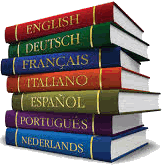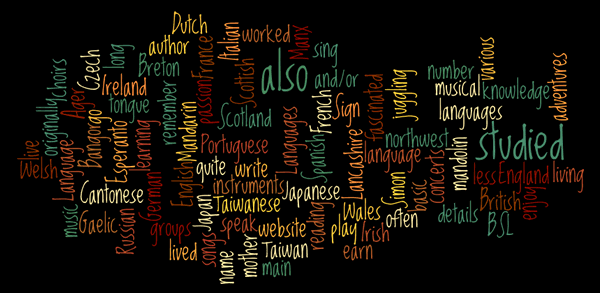Simon Ager's1 Language learning adventures
I am fascinated by languages and have been learning them, on and off, since 1981. I currently speak five languages fluently, six semi-fluently, and have a basic knowledge of ten or so others.
This page gives a summary of the languages I know and have studied, in more or less chronological order of when I first started playing with them.
English
English is my native language, and was the only language I spoke until the age of 11. I grew up in Lancashire in the north west of England, and acquired an R.P. accent from my parents, and some aspects of other accents and dialects from other people. My accent tends to change depending on who I'm talking to, and I enjoy mimicing different regional accents, which is possibly one of the reasons why I developed such an interest in languages.
Welsh (Cymraeg)
Welsh was probably the first other language I encountered. My mother, a non-Welsh-speaking Welsh woman* who grew up in England, and has tried to learn Welsh a number of times. So there were Welsh language materials around the house and I picked up some odd words and phrases, and I always wanted to learn the language. I studied some Welsh in 1998, did courses in Wales in 2007 and 2008, and since 2008 I have lived in Bangor in North Wales, and regularly use Welsh. I can now speak, understand, read and write Welsh well.
* This idea is much easier to express in Welsh:Cymraes di-Gymraeg.
French (français)
I started learning French at secondary school in 1981 at the age of 11. It was compulsory for the first three years, and as I found it interesting and had a vague idea that I'd like to work abroad one day, I decided to continue studying it after that. After finishing school in 1988 I spent a year working in various places, including three months in France, and became fluent in French. After that I only used my French occasionally and it became somewhat rusty, until I started going to a French conversation group every week in Bangor. I now can speak French fluently.
German (Deutsch)
I started learning German at secondary school in 1982. It was an option that I chose because I thought it would be interesting, and because I seemed to have some talent for languages. I continued learning it for six years. Since leaving school I rarely used my German and it has become somewhat rusty. However when I meet German speakers and on trips to Germany I have found that I can get by in German and understand it quite well.
Icelandic (Íslenzku)
During my year off between school and university (1988-1989) I had a vague notion of trying to find a job in Iceland. Why Iceland? Well it seemed like a good idea at the time. I bought a Linguaphone Icelandic course and had a go at learning the language. After struggling with a few lessons I gave up. I didn't go to Iceland in the end but would like to one of these days.
Italian (italiano)
I learnt a little bit of Italian in 1988, and learnt some more in 2002 before going on holiday to Sicily. Since then I've learnt a bit more, and find I can understand and read the language quite well, though my speaking and writing abilities are limited.
Japanese (日本語)
I dabbled briefly with Japanese in 1988 with a Linguaphone course, then I studied it, along with Chinese, at the University of Leeds from 1989 to 1993. During my second year at university I spent a semester (4 months) studying Japanese language and history at a university in Osaka. After graduating I spoke Japanese quite well, but as I haven't used it much since I've forgotten a lot of it. I can still have a basic conversation and understand the language to some extent.
Portugese (português)
While working in a hotel in Jersey in 1989 I picked up a bit of Portuguese from my colleagues, most of whom were from Madeira. I learnt some more Portuguese before going on holiday to Madeira in 2002, and to northern Portugal the following year.
Thanks to my knowledge of French and Spanish I can understand written and spoken Portuguese to some extent, and can have a basic conversation.
Cantonese (廣東話)
While studying in Taiwan in 1990 and travelling in China in 1991 I learnt some Cantonese from friends and from books. I learnt some more after I returned to Taiwan in 1993, and have studied the language a bit since then. I can understand it to some extent and have a very basic conversation.
Taiwanese (台語)
I learnt some Taiwanese while working in Taipei from 1994-98. At first I tried to learn from friends entirely by ear without making any notes. This didn't work very well, so I tried learning it from books as well. I became familiar with the sounds of the language as I heard it every day, but have yet to learn more than the basics.
Scottish Gaelic (Gàidhlig)
I first got interested in Scottish Gaelic through music while at school, and finally got round to learning it in 1996 while I was in Taiwan. Before then I'd tried to learn some Gaelic songs, and since then I've done a number of courses in Gaelic songs atSabhal Mòr Ostaig, the Gaelic college on the Isle of Skye. I can understand, speak and read Gaelic quite well, and write it to some extent.
Spanish (español)
I started learning Spanish in 1998 while I was in Taiwan as I had a plan to go travelling in South America. Since then I've learnt bits and pieces of Spanish now and then, and have acquired a large collection of Spanish language material. I have been to Spain, Mexico, Guatemala and Cuba and can speak Spanish at a basic level, and understand and read it to some extent.
Esperanto
In 1999 I started learning Esperanto out of interest and to see if it was as easy as people claim it to be. It is relatively easy to learn, and I can understand and read it, and speak and write it quite well. I use it at the polyglot events, and also practice it with a friend on Skype fairly regularly.
Irish (Gaeilge)
I first got interested in Irish through music while at school, and started learning it in 2004. Before then I'd tried to learn some Irish songs, and since 2005 I've studied Irish in Donegal in Ireland for a week or two every summer. I can now understand, speak, read and write and sing in Irish well.
Czech (?e?tina)
I started learning Czech in 2006 as I had some Czech friends and I thought it would be interesting to learning a bit of the language. Since then I've studied Czech every so often and can now have a basic conversation in it and understand it to some extent.
Russian (Русский язык)
I first started learning Russian in 2007 as I wanted to try a Rosetta Stone course in a language I didn't know, and because part of my job involved putting together websites in Russian. Since then I've studied Russian every so often and can now have a very basic conversation in it.
British Sign Language (BSL)
In 2009 I started learning BSL mainly out of curiosity. I used online courses and other resources, and some books and DVDs. I found the language fascinating and would like to learn more.
Breton (Brezhoneg)
I started learning Breton in 2012, having previously only dabbled with it briefly. This was partly because I hosted some Breton-speaking couchsurfers at that time, and because I was curious to know how Breton is similar and differs from Welsh. I completed most of an Assimil course, and got to the stage where I could read and speak the language to a limited extent.
Dutch (Nederlands)
I started learning Dutch in 2013 partly out of interest to see how it compares to German and English, and because I have a number of Dutch and Dutch-speaking friends. Thanks to my knowledge of English and German I can understand written and spoken Dutch to some extent, and am gradually improving my speaking and writing abilities.
I've also learnt some Hungarian,Turkish and Arabic for tripsto Hungary, Turkey and Morocco, and have dabbled with Latin, Hindi, Urdu, Swedish and Serbian for fun and interest.

Simon Ager's1 :This article was extracted from Omniglot (the online encyclopedia of writing systems & languages), wrote by Simon Ager.